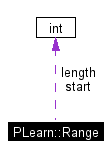
#include <Range.h>
Collaboration diagram for PLearn::Range:

Public Member Functions | |
| Range (int the_start=0, int the_length=0) | |
| bool | isEmpty () |
| bool | operator== (Range r) const |
| bool | operator< (Range r) const |
| operator void * () | |
| to allow if(range) statements (safer than operator bool, according to Nicolas.) | |
Public Attributes | |
| int | start |
| index of first element | |
| int | length |
| number of elements | |
|
||||||||||||
|
|
|
|
Definition at line 65 of file Range.h. References length. |
|
|
to allow if(range) statements (safer than operator bool, according to Nicolas.)
Definition at line 74 of file Range.h. References length. |
|
|
|
|
|
|
|
|
number of elements
Definition at line 60 of file Range.h. Referenced by isEmpty(), operator void *(), operator<(), PLearn::operator<<(), operator==(), Range(), and PLearn::TVec< pair< real, real > >::subVec(). |
|
|
index of first element
Definition at line 59 of file Range.h. Referenced by operator<(), PLearn::operator<<(), operator==(), Range(), and PLearn::TVec< pair< real, real > >::subVec(). |
 1.3.7
1.3.7